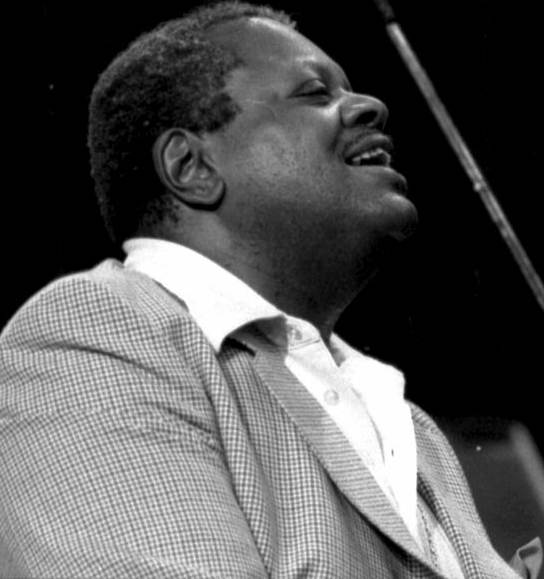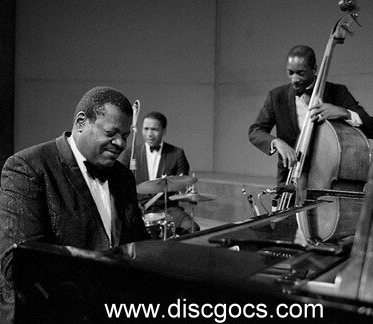Nick
Catalano is a TV writer/producer and Professor of Literature
and Music at Pace University. He reviews books and music for
several journals and is the author of Clifford
Brown: The Life and Art of the Legendary Jazz Trumpeter,
New
York Nights: Performing, Producing and Writing in Gotham
, A
New Yorker at Sea,, Tales
of a Hamptons Sailor and his most recent book,
Scribble
from the Apple. For Nick's reviews, visit his
website: www.nickcatalano.n
I don't
believe that a lot of the things I hear on the air today
are
going to be played for as long a time
as Coleman Hawkins records or Brahms concertos.
Oscar Peterson
In his well-storied
career, Oscar Peterson had a ton of memorable appearances
in NYC beginning in the 40s with his association with producer
Norman Granz. But none were more celebrated and publicized
than a multi-Grammy winning stint at the Blue Note  in
1990. Recorded live by Telarc, the sessions resulted in a
4 album issue of a reunion with guitarist Herb Ellis and bassist
Ray Brown. These albums set a high standard for jazz musicians
who were moving to New York in droves. New clubs were opening,
new music schools were filling up rapidly with international
students who wanted to hang with Miles Davis; and Jazz at
Lincoln Center had opened its doors ushering into the city
a jazz naissance that the music had never had.
in
1990. Recorded live by Telarc, the sessions resulted in a
4 album issue of a reunion with guitarist Herb Ellis and bassist
Ray Brown. These albums set a high standard for jazz musicians
who were moving to New York in droves. New clubs were opening,
new music schools were filling up rapidly with international
students who wanted to hang with Miles Davis; and Jazz at
Lincoln Center had opened its doors ushering into the city
a jazz naissance that the music had never had.
During this time
I was teaching literature and music at a local university,
directing choral groups and musicals, coaching football, writing
books and producing all the arts (opera, ballet, comedy, lectures,
jazz concerts etc.) as the University’s Performing Arts
director. I also found time to write about jazz for several
magazines. In this capacity I was inundated as were the other
four or five NYC critics by hordes of musicians who needed
ink for their new CDs, club appearances and media interviews.
So . . . one week
in March 1990 Oscar Peterson came to town to record several
live performances at the Blue Note. The city was abuzz with
news of the legend’s return, and, as I drove, I slowed
down in my car in front of the club and smiled as I saw movers
struggling with the huge Bosendorfer grand that Peterson always
required. Nevertheless, I continued on because, darn it, I
was so busy that week that I might not be able to get to see
Oscar. I had promised several musicians appearing at other
rooms that I’d stop in and write some reviews at the
end of the week which came in a flash.
Finally, only
one night remained to get to the Blue Note but when I looked
at my schedule I muttered “hell.” Still, I hoped
for the best. In the early a.m. I did a lecture on how Plautus
had influenced The Comedy of Errors followed by my
Ancient Greece seminar. After I taught an afternoon class
on Keats’ drama I rushed out to the football field for
a meeting on some new zone defenses. Then I conducted sectional
rehearsals for the chorale and segued to direct the second
act of Guys and Dolls -- the spring musical.
After the long
day at the University I drove to mid-town and with considerable
effort I parked the car next to Birdland while scarfing a
slice of pizza. When I did reviews I always told the performers
that I could only stay for three tunes if it had to be a night
of multiple reviews. The music was fine at Birdland; soon
I found myself flying down to Greenwich village and parked
next to The Vanguard. As I got to my press seat I realized
I hadn’t slept well and had just finished a 16/hour
day. This next review would be it -- I was exhausted. “No
Oscar tonight,” I moaned.
As I drove home,
somehow, I found myself slowing down in front of the Blue
Note. ”No way,” I thought, but pulled to the curb.
“The hell with it.” I’m sure I was so tired
that I was impolitely abrupt as I showed my press pass to
a Maître d' I hadn’t seen before. I half slid,
half fell on to my usual press seat.
Oscar was playfully
running through some changes as he joked with patrons seated
in front.
Born in Montreal
in 1925, Oscar Peterson had by 1990 established a jazz reputation
second to none. Heavily trained in classical music he had
had teachers whose pedigree could be traced back to Franz
Liszt. By age nine he had established a 4-6 hour per day practice
schedule and had begun to perform professionally. At 14 he
won the national music competition organized by the CBC, and,
captivated by traditional jazz, played in bands with Maynard
Ferguson and Johnny Holmes; he also starred in a weekly radio
show. When he met Norman Granz in 1949 who was having great
success with his Jazz at the Philharmonic series, Peterson
quickly became a mainstay. The series proved to be the most
successful in the history of the music up to that point and
Peterson soon became a major jazz headliner.. In the next
few years he made scores of top selling recordings and, with
Granz as his manager, embarked on a career that established
him as a household name in jazz.
Because of his
enormous talent, and not the least because of Granz’s
producing genius, by 1990 and legendary Blue Note shows, his
place in the jazz hall of fame was secure.
But there was
more to come.
In the years immediately
prior to the Blue Note show, I had come to know Oscar pretty
well; I had written about several of his appearances, and
had long begun to appreciate the considerable talents he had
outside of jazz. In addition to scores of musical honours,
Canadian Prime Minister Jean Chretien had offered him the
position of Lieutenant-Governor of Ontario.
So . . . I sat
at the Blue Note that rainy night in March, ordered some food,
struggled with fatigue from all of the aforementioned disparate
activities, and swore I would stay for only two tunes even
though the personnel were a formidable group of jazz icons
that Oscar had recorded and performed with for decades: guitarist
Herb Ellis, bassist Ray Brown, and, added for this recorded
live performance, drummer Bobby Durham.
After the emcee
intros, the group launched into “Honeysuckle
Rose,” the standard that every pop music
lover has heard a thousand times. But almost immediately,
the tune sounded new and different; the key to the novelty
lay in the canny improvisational departures from the standard
chord changes. Obviously, improvs were expected after the
32 bar theme. But what followed could only be described as
explosive variations on the variations. Led by Peterson’s
amazing right hand lines, humorous 4, 8, and whole chorus
trades with Ellis, and intriguing harmonic lines from Brown,
the entire room began to swing. Even staid first-nighters
who often prefer conversation to focused listening, were toe-tapping
and finger popping all over the place. I had seen and heard
Peterson many times, but what was happening on the Blue Note
stage on this March evening transcended past performances.
The music certainly dissipated most of my fatigue. I gazed
around the room and chuckled at the hypnosis Peterson had
infused on the patrons.
After another
medium swing tune dubbed “Sushi”
that featured beguiling chromatic adventures, Oscar launched
a 2-tune ballad medley with “I Remember You”/
“Tenderly.” Throughout, he referenced the melodic
lines with double and triple time sequences that had not been
heard since the iconic Art Tatum days. No one else had ever
attempted these runs that sounded like there were three or
four pianists on stage playing the feverish tempi.
By the time this
medley was over, I found myself frustrated. Oscar simply would
not let me go home to bed. It had become a historic evening.
Peterson rarely
employed a drummer in his small groups for the simple reason
that, as was the case with Art Tatum, few percussionists could
keep up with their speed and spacing. But with the light speed
performance of “Sweet Georgia Brown” I understood
why Oscar had brought Bobby Durham along for the 4-week stint,
first at the Tokyo Blue Note and then here in Gotham. Durham’s
time was flawless and his solo was stage shattering. “Sweet
Georgia Brown” began with Peterson improvising changes
on the verse of the tune and then trading sequences, still
on the verse, with Ellis. They playfully continued the trades
and because the exchanges were so imaginative this went on
and on until Peterson finally jumped into the melody line.
Throughout, the articulation of the group performing at light
speed was astounding. If this were the only song performed
on this magical night, the show would still have been historic.
By the end of
the set, adrenalin had dissipated much of my fatigue so that
I trekked up to the dressing room to join the throng of well-wishers.
After a hug and a handshake, I searched for some superlative
phrases to express my amazement at the performance. Oscar
and I laughed a bit as I said the recording would sell forever.
This astonishing
performance occurred 30 years ago and the Telarc recording
of this singular Blue Note event is still in demand.
COMMENTS
reader comment
Not surprisingly, here again women are absent from
the history books. In future writings about Oscar Peterson
please mention the person who first taught him piano and encouraged
him to perfect his craft; his big sister Daisy Sweeney. No
Daisy, no Oscar.
richardcaputo@sbcglobal.net
Nick, you did it again. A superlative review of a superlative
performance!
Maureen
Beautifully elucidated narrative, as usual. Always a pleasure
to read your work.
Susan Steiger
Nice work Nick - wish I had been there.